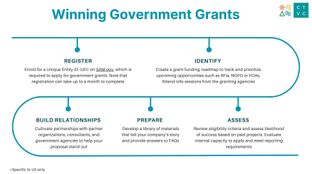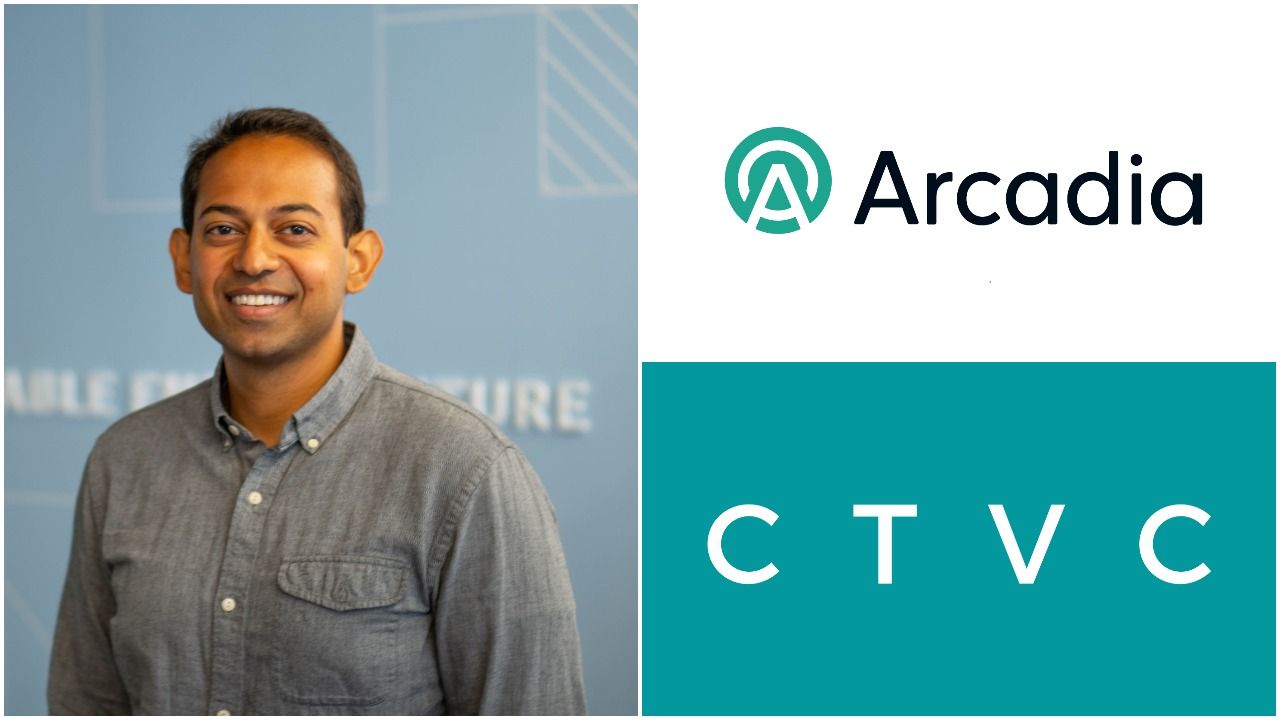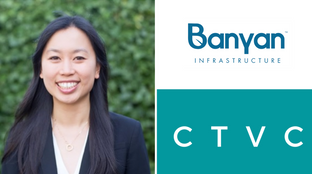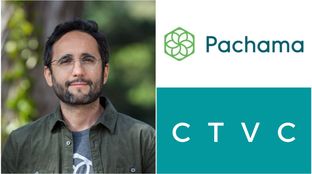
🌎 Get ready with me: Government grants edition 💅💵
A founder’s guide to winning non-dilutive funding with Elemental Excelerator

What’s new about solar? The largest manager of community solar subscriptions in the US has never built a solar project themselves. Arcadia plays software in a sea of hardware, and is following the fintech neobank model in pushing things customer and data first. Since 2013, Arcadia has been connecting customers with clean energy, regardless of zip code, on a mission to make solar accessible to everyone. Now they’re the latest climate tech investment mega-round, with $100m in funding from Tiger Global and Drawdown Fund - a pair of investment bedfellows both new to the climate landscape. In this week’s feature, we run it back to the beginning with Kiran Bhatraju to share how Arcadia’s ambitions have expanded alongside the market.
What’s the 101 on community solar?
Community solar is the in-between of utility-scale and rooftop solar - it’s the best way to increase access to cheaper and cleaner energy for all. Community solar operates as a ‘virtual-net metering’ structure allowing a developer to build a 100 KW up to 10 MW solar project sited on the distribution grid that generates savings credits applied to a residential or small business customer’s bill. For the two-thirds of Americans who live in apartments, multi-dwelling units, or have a bad roof and can’t do rooftop solar, community solar is really the only alternative. Community solar is also still a bit of a secret; it’s a 4 GW market in a dozen states that few people understand, but I consider it the new retail energy. It’s the fastest growing segment of solar, and fastest growing competitive energy trend in the US today. At Arcadia, we manage 500+MW of community solar across 10 states, and partner with more than 30 solar developers.
What options do consumers have to purchase clean energy? What effect does geography play?
One of the least understood things about energy is the complete balkanization of the US energy market. State by state, region by region, zip code by zip code, the market is entirely different - geography is destiny, at least for clean energy. At Arcadia we’ve created a meta, one-to-many solution, where an energy consumer connects with us and we help them find the customized, best way to source clean energy no matter where they live. In Tennessee, that might be through renewable energy certificates (RECs). In Maryland, that should be through a virtual net metering setup with community solar. Arcadia hosts all of the options currently available in any geography, but we really emphasize community solar - it’s no-risk, guaranteed cheaper-than-the-utility, clean energy - hands down the best consumer energy product out there.
What’s Arcadia’s founding story? What key early differentiating insights led you to start a company?
At my last company, American Efficient, we sold software to utilities - which was often a painful, masochist endeavor. But what we did well was aggregate and sell efficiency into capacity markets. That taught me the necessity of owning the data and payments layer in order to deliver a meaningful customer experience. At the time, residential retail energy was the closest to the customer, but had very little innovation. Retail energy hadn’t lived up to its promise, and most retailers are still run by former Enron traders jacking up rates on customers. Clearly there was space for a dramatically different direct-to-consumer model that owned the experience, the bill, data, and the brand to drive adoption of clean energy.
I spent a lot of time looking at the Fintech space while building Arcadia. The same opportunity - large incumbents treating customers poorly being displaced by upstart neobanks with customer-first brands - directly applies in the energy market. Arcadia’s intent was never to build projects, own assets, or take commodity risk, but centered around software to build connectivity with the consumer and their home energy.
Arcadia has been described as the “Twilio of energy," the “Plaid of energy," and the "Stripe of energy." Which is the best analog?
Those are all incredible platforms with exponential markets, giving developers simple-to-use tools for financial data, programmatic communications, or payments to build better experiences. Arcadia has also built the core data and payments layer needed to unlock energy innovation, and I ultimately believe our market will prove to be just as big as theirs.
To this day, one of the biggest failures of the energy market is not demanding the utility data needed to actually create the energy products that customers want. How do you size a solar system today? Ask for a bill print out. How do you know when to discharge a battery? Look up tariffs in a PUC filing. You can’t build applications if the data isn’t readily available, or missing. Data is core and necessary to delivering new energy products for high-expectations customers no matter the industry.
Think about Plaid - they enabled an entire fintech revolution by enabling access to data from banks for the first time. Our company’s evolution will similarly center around building the digital infrastructure layer to give any new energy company the ability to get that data. We just had to go direct-to-consumer first to prove it.
What are Arcadia’s core technology differentiators?
The crux of the new energy movement will be data, which historically has been “stovepiped” or siloed. We've built the ability to ingest meter level data around how you use energy, whether you paid your power bill on time, what tariffs you're on, know if you’re moving, and all the other rich data that lives within your utility account. Another key differentiator unique to us is the ability to manage a single bill - to actually disintermediate the utility experience and create a branded financial layer. Most people’s only association with their energy consumption is through their monthly power bill. Owning the payment allows you to deliver all sorts of new energy services. A great example of that is a flat bill, or a synthetic tariff.
One of the most exciting things about owning the bill is that it’s the only way in the US to monetize energy efficiency or load shifting at the consumer level. Today, if you're an energy efficiency company, you have to monetize on a capacity market or get the customer to pay you shared savings, which can get quite complex. Whereas, if you own the bill, you can set your target, through a flat bill or synthetic tariff. The customer gets certainty on what they pay each month. And anything you do to decrease a customer’s bill is value that you can capture. This is a gamechanger for the energy efficiency industry. If you want to monetize without needing permission from the utility, ISOs, or capacity markets, owning the bill is the most important pathway - and Arcadia can provide this financial layer.
Our final core technology component is providing the ability to virtually connect customers to community solar easily and simply.
Let’s focus on this last piece. How did you break down barriers to make community solar easy and accessible for customers?
We wanted to get into community solar much earlier than we did. Historically, people buying community solar needed 780+ FICO scores and 20 year contract agreements. We knew we had all this underlying customer data to help with the underwriting without this friction, and we structurally knew community solar was significantly less risky than other forms of solar.
For the asset owner and developer, it’s the only solar product with fractional offtake that’s fungible. That’s insanely important. If I'm a solar developer, and get a corporate to sign a PPA for the project, I still have a single risk in an offtaker. In a community solar project, you've got thousands of offtakers, and if someone moves you can replace them immediately, so the fungibility of that is really powerful for certainty on project returns.
So we knew the customer data could help underwrite offtake, and we knew the product was a fundamentally safer long-term solar bet. Because we wanted to remove the credit check and contract from the process through our data, we faced a lot of challenges in the beginning. We lost a few early MWs to competitors because we didn’t want to compromise on the product experience. I’m grateful for Forefront Power who signed the first deal with us without these barriers, and we eventually moved the entire market. That simplicity doesn't exist yet in rooftop solar, but we've been able to make these amazing strides in community solar in just a few years. It literally takes 2 minutes to sign up and help build new solar with Arcadia.
You noted that community solar can be a “silver bullet for decarbonization and environmental justice”. How does community solar enable clean energy for all?
It would be a tragedy if we decarbonized, but the people who created the problem in the first place were the only ones to benefit. Opening up access to everyone, no matter where they live and as long as they consume power, is a huge piece of making sure the transition is equitable.
Rooftop solar is wonderful but it's still a rich person's product, for people with the right credit score and right home. The way that we’re doing community solar provides benefits to everyone. It’s guaranteed savings without the contracts or second mortgage.
Arcadia is at the forefront of consumer demand for renewables. What are interesting trends you’ve seen and how is Arcadia shifting its business to capitalize on these trends?
One of the most important cultural trends in the past few years is Corporate America actually caring about their carbon footprints. They’ve driven the PPA markets and now their employees also want to decarbonize. COVID actually gave this a huge boost. With people working from home, employers needed new ways to engage employees working from home, and home energy usage was simultaneously going up.
With our acquisition of Nanogrid in April, we ultimately want to provide the tools to electrify and help manage the whole home. EVs are incredible products but no one knows when to charge and how much costs would be, or when would be the least carbon intensive. Nanogrid combined with other products and services we’re working on can take care of all of this for you and make it incredibly simple.
The analogy goes back to fintech companies like Betterment or Wealthfront that operate as your financial guide. In a lot of ways, the modern utility should be an entity that delivers whole home electrification - providing a package of goods and services which makes sense for how you live your life, how you want your home to be powered, and how much you want it to cost. And it's got to be simple, and fun. To do that you need a lot of data and a lot of tools that previously didn’t exist in the energy space.
What do others get wrong about building or investing in this space?
I think people still believe that we can decarbonize with the incumbents, but I personally don’t think that’s going to happen fast enough. It’s hard for incumbents to dramatically change how they do business and selling them products that don’t make sense for their business is a tough uphill task. I learned that the hard way from my first company. The utility sector is huge, but the rate-base is a powerful incentive to keep the status-quo.
This is all to say, I still see a lot of energy companies that aren’t spending the time and money to figure out how to operate within the regulatory frameworks that exist today. Deep regulatory work is important to create markets. Investors laughed because my second hire at Arcadia was a lawyer, but I think it's paid off. Our reg team, led by Max Minzner, a former FERC General counsel and law professor, has been core to our growth.
What upcoming policies from the infrastructure bill do you expect to most impact the industry?
There’s so much to look forward to in the package, such as the direct payments. Once you remove the complexity of tax equity, it aligns the right incentives and isn’t just taxpayers transferring value to large profitable banks. On the Clean Electricity Payment Program (CEPP), it’s great that there are incentive payments to utilities to decarbonize, but I also think those same advantages should be opened to third party providers in order to generate competitive dynamics to drive decarbonization faster and cheaper.
Outside of the existing bill, we’re working hard at the national level to enable community solar. The ability to do virtual net metering is a huge step to decarbonizing and building a resilient grid. If a transmission line goes down, having a Distribution-sited solar farm mitigates the outage impacts.
Another area that we’d like to see more emphasis on is better data standards in the energy industry. You’ve seen this around the transformation of healthcare data and portability of consumer financial data, so I’d love to see the same in the utility industry, especially with smart meters. Data is the crucial missing step that will enable distributed generation and DERs to become widespread.
Congratulations on your Series D fundraise! Tiger Global and the Drawdown Fund are quite the pair of bedfellows. What did you see in the mix of the two funds? What comes next for Arcadia with the fresh $100m?
We already had the best investors in the game with EIP, G2 Venture Partners and others, so we were looking to bring on quality tech investors in this new round. Tiger was one of the largest holders of Sunrun in the public markets, and has a clear view on distributed generation and focusing on the customer. They were also early in Nubank, a Brazilian neobank, so they understand the fintech comparison. We’re also excited about partnering with Drawdown Fund and Wellington because they’re newer climate-focused funds, which is important to our mission.
We’ll use the capital to expand our technology, and grow our community solar footprint. Ultimately, Arcadia sits in the middle of two of the biggest markets in the economy - software and sustainability - there is just so much to build and innovate on in our sector.
Want to bring power to the people? Arcadia is hiring across engineering, product and design, regulatory, solar ops, and beyond. They’re making power moves recruiting folks across tech who have experience in high growth companies serving millions of customers and believe in a 100% renewable energy future. Kiran and team also want to hear from new energy companies grappling with data or payments-related issues - the more complex the billing challenge, the better.

A founder’s guide to winning non-dilutive funding with Elemental Excelerator

Infrastructure investing for impact with Banyan Infrastructure's Amanda Li

Venturing into nature with Diego Saez-Gil at Pachama